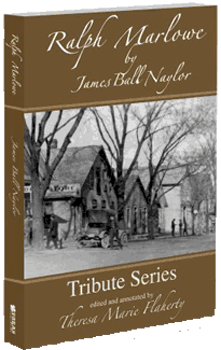Second in our Tribute Series to James Ball Naylor
Dr. James Ball Naylor, better known to readers of newspapers as “S. Q. Lapius,” over which signature a number of decidedly clever sketches and poems have appeared in print, has written a story which will command widespread interest and achieve much deserved popularity, unless the public taste for good literature has deteriorated to an alarming extent. Ralph Marlowe marks the ebbing of the tide which forced the historical novel to the front, and gives us one of the best real, human, modern stories that have been written in a long time. The plot of the story is not intricate, but at the same time it is involved sufficiently to hold the interest of the reader from cover to cover. It is simply a tale of a college-bred young physician who takes a position in a drug store in a little country town in Ohio, falls in love, as all properly described heroes do, and gets married in the last chapter, as is right and happy for all concerned. But the great point of excellence in the story is the marvelous way in which the author has given us the true atmosphere of a country town—not the gawky, burlesqueing, horseplay of the dialectic writers, but the real, homely, honest small-town air, with its lazy scent of apple blossoms in summer and the crisp frostiness of the winter days. Dr. Naylor has given literary immortality to all of his characters, for there can be no doubt that he has drawn them from life. He has not, like the historical romancer, gone far afield and delved into the musty past for his men and women. He has not twisted and distorted history to fit his tale, but he has taken the flesh and blood men and women of these days, told the story of their hopes and fears, their loves and sorrows, their plans and purposes, in a simple, convincing style that wins from the first chapter. There is a certain quaint humor which pervades the story and makes it worth while for anyone who wishes to secure restful entertainment in his reading. The character of Jep Tucker is as real and true to life as if the man himself drawled his anecdotes and passed his odd opinions to the reader’s face, instead of through the medium of ink and type. The story has its faults, if you want to be hypercritical, but they are not the glaring anachronisms which detract from the human interest of the historical romance nor are they the prurient suggestions which are supposed to add realism to the problem novel. “Ralph Marlowe” is as homely and pleasing as “David Harum,” and has the sweetness and richness of “Eben Holden.” It will endure as a story of people who live, and of places that are and of times that we all know. The book is from the press of the Saalfield Publishing Company, New York and Chicago. Price $1.50.
American – Baltimore, Maryland, March 11, 1901
“Laugh and the World Laughs with You” has evidently been one of Dr. Naylor’s mottoes while writing this book, and he has a happy faculty of making his readers see a goodly share of the ridiculous side of human life. The book is full of laughable incidents, told in a most winning way, and, with its fascinating love story, cannot fail to please all classes of readers. The plot is laid in the picturesque hill country of southeastern Ohio, and the adventures and trials of the hero, Ralph Marlowe, will be followed with the keenest relish until the climax is reached—perhaps a climax not expected by all—but one which will in no wise detract from the attractiveness of the first pages.
Dr. James Ball Naylor (“S. Q. Lapius”) has been known to the newspaper world for a number of years as a writer of acceptable verse and fiction, although this is his first real venture between covers. The personnel of his novel are recognized immediately as distinct eccentrics, yet the pictures are made so life like that we forget that they are not real acquaintances. The diction throughout the entire book is pure and simple, and the book, with its lack of profane expressions, slang phrases, etc., is one which will be greatly enjoyed when read aloud in the family circle.


